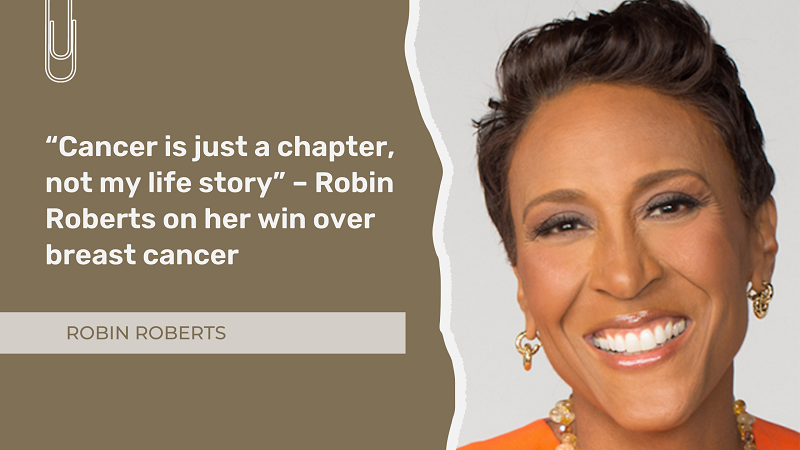
Robin René Roberts, 61, is an American television broadcaster. Roberts is the anchor of ABC’s Good Morning America. She has earned popular awards like Emmy Awards for three consecutive years and other notable nominations that prove her excellence in Broadcast Journalism. Roberts contributed reporting to ESPN for 15 years. She has hosted popular shows and interviewed many notable personalities like Barack Obama, Debbie Allen, Tom Holland, etc. She has been treated for breast cancer and for myelodysplastic syndrome.
In 2007, the co-host of “Good Morning America” shared her diagnosis of breast cancer that changed her outlook on her life. She performed a self-exam and found a lump in her breast, as a way of paying tribute to her former colleague Joel Siegel, a film critic, who had fought and lost his life to colon cancer. Siegel’s advocacy on early screening and prevention of cancer motivated her to undergo examination.
On July 17, after undergoing a biopsy, she was diagnosed with early-stage breast cancer. After the diagnosis and discussing the treatment options, she announced on air that she will be undergoing chemotherapy. Roberts said her doctors determined effective treatment plan for her case. She underwent surgery, 8 chemotherapy treatments and 6 weeks of radiation therapy (Chemotherapy followed by radiation treatment) and recovered completely. Roberts went back to her work in just few weeks after her recovery.
Ever since then, Roberts has been vocal and advocating about early screening and prevention of cancer. Breast cancer screening test like mammogram is used to screen women who have a high risk of breast cancer. Other tests that help in the diagnosis are breast exam, breast ultrasound, biopsy (extracting a sample of breast cells to detect cancer), and breast magnetic resonance imaging (MRI).
About breast cancer screening
The goal of breast screening is to catch early cancers. Screening has significant impact on mortality and over all prognosis of breast cancer. Early-stage cancers are easier to treat than late-stage cancers. Most guidelines support screening in women beginning at 40 every year. In women with notable family history of breast cancers, it is recommended for breast examination to know and evaluate the risk factors. Even in women who have experienced no symptoms or have no family history are recommended for breast screening. It is important to know that about 85% of breast cancer have occurred in women with no family history.
Breast self-examination: What is it?
One of the first steps in detecting breast cancer is self-examination. It is a highly recommended practise for women and should be included in daily routine. Self-examination includes inspecting your breasts and if you observe any changes in your breast size, lumps or fluid discharge, it is important to get a Clinical Breast Exam (CBE). In CBE, a healthcare provider will perform a physical exam to check your breasts for lumps or other changes. If lumps are detected, mammogram is suggested. Mammogram is an effective tool. If mammography shows anything suspicious, you will be called for a follow up visit. Most likely, the next step is a diagnostic mammogram or breast ultrasound. In some cases, a breast MRI or a biopsy may be recommended.
After a complete recovery from breast cancer, Roberts suffered another health crisis in 2012, when she was diagnosed with myelodysplastic syndrome (MDS), a rare blood disorder affecting the bone marrow. Remembering the day, she underwent the painful bone marrow testing, Roberts says that she found out she would be interviewing the then President Barack Obama the next day and was overwhelmed with joy and gratitude.
Reportedly, she underwent a bone marrow transplantation which she received from her older sister. After a few months of leave, she returned to the screen on February 2013 and expressed gratitude towards life and the viewers who helped her with tips and ideas for dealing with treatment.
Sharing her two cancer journeys, Roberts calls herself blessed and says “Make Your Mess Your Message”. She says that you can handle anything that life throws at you and it is helpful to have a good sense of humour – as a way of encouraging those who are fighting cancer.
References:
- TV Anchor Robin Roberts Has Rare Bone Marrow Disorder. MedicineNet. https://www.medicinenet.com/script/main/art.asp?articlekey=159195
Accessed on 05-03-2022 - Robin Roberts – Abundantly Blessed. CancerConnect. https://news.cancerconnect.com/survivorship/robin-roberts-abundantly-blessed
Accessed on 05-03-2022 - Robin Roberts: WhyThis is the Prime of Her Life. Prevention. https://www.prevention.com/health/a20457275/robin-roberts-exclusive-interview-surviving-breast-cancer/
Accessed on 05-03-2022 - Robin Roberts to Undergo Chemotherapy. Abc NEWS. https://abcnews.go.com/GMA/CancerPreventionAndTreatment/robin-roberts-undergo-chemotherapy/story?id=3622787
Accessed on 05-03-2022 - Robin Roberts. US weekly. https://www.usmagazine.com/celebrities/robin-roberts/
Accessed on 05-03-2022 - Robin Roberts Shares Her Most Valuable Life Lessons. Forbes. https://www.forbes.com/sites/moiraforbes/2014/09/26/robin-roberts-shares-her-most-valuable-life-lessons/?sh=5e142fd83b33
Accessed on 05-03-2022 - Robin Roberts: Making Her Mess Her Message. Cure Today. https://www.curetoday.com/view/robin-roberts-making-her-mess-her-message
Accessed on 05-03-2022 - ‘GMA’ anchor Roberts says she has cancer. The Hollywood Reporter. https://www.hollywoodreporter.com/business/business-news/gma-anchor-roberts-says-she-145892/
Accessed on 05-03-2022 - Breast Self-Exam may not be Effective! Learn about different Breast Cancer Screening Methods. Code X Genetics. https://www.codexgenetics.com/blog/en/Breast-Self-Exam-may-not-be-Effective-Learn-about-different-Breast-Cancer-Screening-Methods/
Accessed on 05-03-2022 - Breast Cancer. Mayo Clinic. https://www.mayoclinic.org/diseases-conditions/breast-cancer/diagnosis-treatment/drc-20352475
Accessed on 05-03-2022 - Mammogram guidelines: What are they? https://www.mayoclinic.org/tests-procedures/mammogram/expert-answers/mammogram-guidelines/faq-20057759
Accessed on 05-03-2022 - Breast Cancer Screening (PDQ®)–Patient Version. National Cancer Institute. https://www.cancer.gov/types/breast/patient/breast-screening-pdq
Accessed on 05-03-2022 - Breast Screening Revisited. National Center for Biotechnology Information. https://www.ncbi.nlm.nih.gov/pmc/articles/PMC4311339/
Accessed on 05-03-2022 - What Is Breast Cancer Screening? Centers for Disease Control and Prevention. https://www.cdc.gov/cancer/breast/basic_info/screening.htm
Accessed on 05-03-2022 - Breast Cancer Facts and Statistics. Breastcancer.org. https://www.breastcancer.org/facts-statistics
Accessed on 05-03-2022 - 3 steps to early breast cancer detection. Piedmont. https://www.piedmont.org/living-better/3-steps-to-early-breast-cancer-detection
Accessed on 05-03-2022 - Everything you should know if you need a follow-up test. KnowYourGirls. HealthSource. https://knowyourgirls.org/resources/everything-you-should-know-if-you-need-a-follow-up-test/
Accessed on 05-03-2022
Know the cancer – Breast cancer treatment
